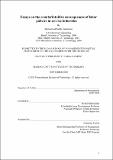| dc.contributor.advisor | Hazhir Rahmandad. | en_US |
| dc.contributor.author | Hashemian, MohammadMahdi. | en_US |
| dc.contributor.other | Sloan School of Management. | en_US |
| dc.date.accessioned | 2021-01-06T17:39:37Z | |
| dc.date.available | 2021-01-06T17:39:37Z | |
| dc.date.copyright | 2020 | en_US |
| dc.date.issued | 2020 | en_US |
| dc.identifier.uri | https://hdl.handle.net/1721.1/129091 | |
| dc.description | Thesis: Ph. D., Massachusetts Institute of Technology, Sloan School of Management, September, 2020 | en_US |
| dc.description | Cataloged from student-submitted PDF version of thesis. | en_US |
| dc.description | Includes bibliographical references. | en_US |
| dc.description.abstract | In essays one and two, I examine how unstable schedules affect financial performance. In essay one, using 52 weeks of data from over 1,000 stores and more than 15,000 employees of a specialty retailer, I estimate the effect of unstable schedules on store productivity. I use an instrumental variable approach and a natural experiment to partially address the possible endogeneity of scheduling decisions. I find evidence that increasing the adequacy and consistency of employees' hours improves employee and store productivity and find partial support for the positive effect of predictability. To study the policy impact of these findings, I build a behavioral agent-based model of scheduling in essay two. My model provides a platform to conduct counterfactual analyses and thus increases the external validity of my findings. | en_US |
| dc.description.abstract | Results suggest that standard scheduling practices, under certain conditions, may have negative, direct labor cost consequences despite their intended rationale for aligning service capacity and demand. Findings highlight the unintended consequences of a narrow focus on matching labor supply to customer demand; designing more employee-friendly schedules could not only create better jobs but also improve firm performance. In essay three, I build a simulation model to explain why Startups play a major role in establishing many new markets when existing firms have more resources and the relevant core and peripheral capabilities. I explore how the strong link between startups' past performance and the resources available for their future capability building conditions their growth prospects. I show that this reinforcing loop leads to entrepreneurial financial markets rapidly focusing on more promising startups. | en_US |
| dc.description.abstract | The strength of this mechanism can allow startups to over-take projects within incumbent firms that are initially better endowed. Using an online experiment, I test the key requirement for our mechanism, showing that the strength of the reinforcing loop is larger for start-ups than in-house projects. | en_US |
| dc.description.statementofresponsibility | by MohammadMahdi Hashemian. | en_US |
| dc.format.extent | 101 pages | en_US |
| dc.language.iso | eng | en_US |
| dc.publisher | Massachusetts Institute of Technology | en_US |
| dc.rights | MIT theses may be protected by copyright. Please reuse MIT thesis content according to the MIT Libraries Permissions Policy, which is available through the URL provided. | en_US |
| dc.rights.uri | http://dspace.mit.edu/handle/1721.1/7582 | en_US |
| dc.subject | Sloan School of Management. | en_US |
| dc.title | Essays on the counterintuitive consequences of labor policies in service industries | en_US |
| dc.type | Thesis | en_US |
| dc.description.degree | Ph. D. | en_US |
| dc.contributor.department | Sloan School of Management | en_US |
| dc.identifier.oclc | 1227097568 | en_US |
| dc.description.collection | Ph.D. Massachusetts Institute of Technology, Sloan School of Management | en_US |
| dspace.imported | 2021-01-06T17:39:36Z | en_US |
| mit.thesis.degree | Doctoral | en_US |
| mit.thesis.department | Sloan | en_US |
